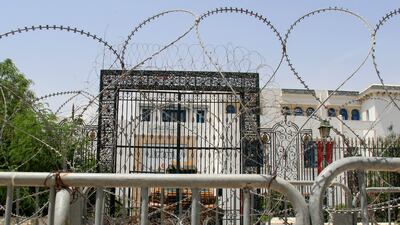Tunisia’s largest party, Ennahda, appears to be fraying at the seams after President Kais Saied’s abrupt decision to dismiss the government and freeze parliament.
Despite initially presenting a united front in denouncing Mr Saied’s actions as unconstitutional and a coup d’etat, a growing number of Ennahda MPs are now criticising their party.
Ennahda, led by parliament speaker Rached Ghannouchi, was the target of much of the blame during nationwide protests on July 25 over the economy, corruption, and the government's handling of the Covid-19 pandemic, and several of its offices were vandalised. Although it has not led a government since 2013, the Islamist party has held the majority of the seats in parliament and dominated Tunisian politics since its resurgence after the 2011 revolution.
The protests prompted Mr Saied to invoke Article 80 of the constitution, which allows the president to take exceptional measures in times of “imminent danger” to the country.
After an emergency meeting of the party’s Shura Council on Wednesday evening, three prominent Ennahda MPs announced on social media that they had walked out and distanced themselves from any subsequent decisions.
Yamina Zoghlami, an MP who has become increasingly critical of her party over the past year, told The National she left the meeting because Ennahda “did not listen to what people are saying”.
“They didn’t even notice that people on July 25 and after the application of Article 80 were happy,” she said, referring to nationwide celebrations after Mr Saeid's action. “The leadership of the movement of Ennahda and Professor Rached Ghannouchi did not understand their message. Logically it is not possible [for him] to lead the parliament and the party at the same time. We’ve entered a phase of failure and the reaction of the angry people made this clear.”
The sentiment was echoed by other Ennahda members.
“Those who took control of Ennahda since the last elections can't run away from unavoidable reforms,” party MP Imed Hammami said in a television interview. “I'm talking about the president of the party, the head of [the] Shura Council, etc. They caused the paralysis of the party institutions. They kept pushing forward and now we see the result.”
He said Mr Saied acted within the framework of the constitution and had to intervene in light of recent events.
“How can we say it’s a coup?”
Mr Ghannouchi on Wednesday appeared to soften his opposition to Mr Saied’s move, calling it an opportunity for democratic reform in comments posted on Ennahda's Facebook page, Reuters reported.
But the post was later deleted and his daughter, Yusra Ghannouchi, told The National that a member of the party's Shura Council had wrongly attributed his own statement to the Ennahda leader.
A statement released by the Shura Council on Thursday again referred to a coup, but also expressed its “understanding of growing popular anger particularly amongst the youth due to economic and social failings”.
The council said it held “the whole of the political class responsible”, and called for apologies and recognition of its mistakes.
Shura Council member Ahmed Gaaloul, an adviser to Mr Ghannouchi, told The National he did not think there was “division” within Ennahda, and that conflicting views were natural to a democratic organisation. “We are not a party with one vote, one man, one voice,” he said.
However, Selim Kharrat, a member of local democratic watchdog Al Bawsala, said Ennahda's shifting vocabulary and dissenting voices gave the party a “contradictory, troubled” image.
“This translates as if the party has not been able to fix a coherent position that represents the majority of the party,” Mr Kharrat told The National. “These contradictory messages are counterproductive and damaging to the party itself. The message needs to be clear and call for internal solidarity.”

Mr Kharrat said the “internal crisis” within Ennahda was not new, and that dissent and calls for reform have been growing since the 2019 elections. “The events of July 25 accelerated this division.”
While it was imperative that the party take responsibility, there have been no moves towards transparency or accountability, he said.
“The Ennahda we know is dead; their future is very uncertain today.”
Mr Gaaloul acknowledged that there was a need to rethink the structure and image of the party and address its failures.
“We have failed in opening up as a party, from a traditional party – quite a conservative, social organ in Tunisian society – to an open and multicoloured party. So we need to start doing that,” Mr Gaaloul told The National.
“Also, we were not successful, let’s say we even failed, in becoming a party that can govern. And the proof of that is that with one click, we are out of power. So we need to deal with that … we did not deliver to the people,” he said.
“So yes, there is a need to reform, internally and in our agenda and in everything.”
Ms Zoghlami said the reforms must include more involvement of women, describing Ennahda as a “masculine party par excellence”.
“We need a decision about the leadership and we need a plan for the future of Ennahda; we need a different image for the party,” she said.
“Does Ennahda want to maintain democracy or just maintain its place within it?”










